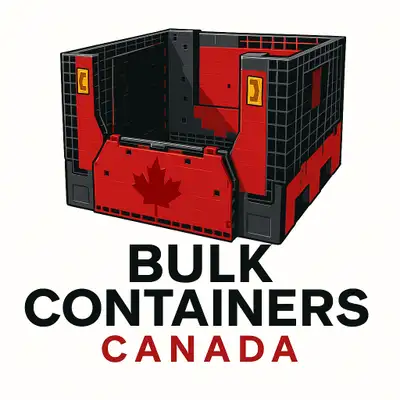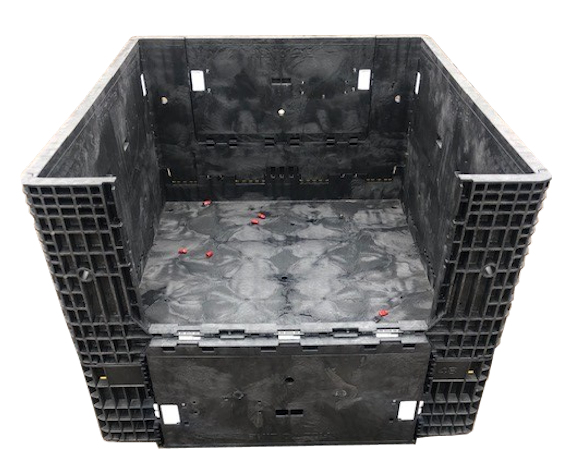The Ultimate Guide to Choosing the Right Mass Containers for Your Company Demands
Selecting the suitable mass containers is crucial for any type of organization that counts on reliable logistics. Different types of containers exist, each created for specific products and applications. Elements such as size, material compatibility, and governing criteria play a significant duty in this decision-making process. Comprehending these aspects can cause boosted functional effectiveness. However, numerous services overlook crucial elements that could improve their general efficiency and sustainability. What are these factors to consider?
Recognizing Different Kinds Of Mass Containers
Mass containers function as vital devices for companies seeking efficient storage and transport remedies. These containers are available in different kinds, each created to fulfill certain operational needs. One usual kind is the intermediate mass container (IBC), which is suitable for liquid and granulated products, supplying a balance of capability and ability to move. An additional popular option is the mass bag, or FIBC, appropriate for dry, flowable products. These adaptable containers are lightweight and can be easily delivered and stored. For larger products, inflexible bulk containers are usually employed, giving longevity and security for risk-free handling. In addition, there are specific containers tailored for hazardous products, ensuring conformity with safety laws. Understanding the distinct characteristics of these bulk container types permits companies to make educated choices that maximize logistics and decrease prices. By choosing the ideal container, companies can enhance their operational efficiency and enhance their supply chain processes.
Trick Material Factors To Consider for Bulk Containers
When selecting bulk containers, it is important to contemplate the materials made use of in their building and construction. Factors such as sturdiness, chemical, and strength compatibility play an important function in making sure the containers meet details functional requirements. In addition, weight and mobility worries can influence both performance and transportation logistics.
Material Longevity and Toughness
Durability and strength are vital aspects in choosing products for mass containers, as they directly affect the container's capability to endure different ecological conditions and managing processes. Products such as high-density polyethylene (HDPE), polypropylene, and stainless-steel are generally preferred for their robust residential properties, supplying resistance to temperature, abrasion, and impact fluctuations. The option of material additionally influences the total lifespan of the container; stronger materials typically lead to less regular replacements, resulting in cost savings in time. Furthermore, the weight of the product can affect delivery expenses and convenience of handling. Services should consider their particular operational settings and the capacity for wear and tear to ensure peak longevity and stamina in their mass container choice.
Chemical Compatibility Variables
Comprehending chemical compatibility is vital for choosing mass containers, as the materials utilized have to stand up to the particular substances they will hold. Different variables influence compatibility, including the chemical nature of the contents, temperature, and period of storage. Destructive chemicals might call for containers made from stainless steel or specialized plastics that stand up to degradation. Furthermore, responsive compounds can generate warmth or gases, demanding vented or pressure-rated containers. The choice of container product, whether polyethylene, polycarbonate, or metal, must line up with the chemical buildings of the saved materials to stop breaches or leakages. Ultimately, a complete examination of these compatibility elements guarantees safe handling and storage, shielding both personnel and the atmosphere while preserving item honesty.
Weight and Portability Issues
Selecting bulk containers includes not only examining chemical compatibility however likewise taking into consideration weight and mobility. Businesses have to examine the simplicity of handling and transport to optimize efficiency. Lightweight products like high-density polyethylene (HDPE) or light weight aluminum can help with simpler movement and decrease shipping costs. Conversely, heavier containers may give improved toughness but can hinder wheelchair, particularly in atmospheres needing regular relocation. In addition, the layout of the container ought to permit hassle-free lifting and piling, ensuring ergonomic safety for employees. Business need to likewise take into consideration the framework readily available for transport; for instance, containers compatible with forklifts or pallet jacks can simplify procedures. Eventually, the appropriate balance in between weight and transportability straight affects operational efficiency and expense effectiveness.
Sizing Your Mass Containers for Optimum Efficiency
When sizing mass containers, organizations need to carefully examine the measurements needed to accommodate their details products. In addition, weight ability is a vital aspect that influences effectiveness and safety and security during transport and storage. Reliable sizing not only takes full advantage of space but likewise enhances operational process.
Figuring Out Container Dimensions
Selecting the best dimensions for mass containers is vital for making the most of efficiency in storage and transport. Services must evaluate their details requirements, taking into consideration elements such as offered area, the nature of the items being stored, and the methods of transportation used. Precise dimensions guarantee that containers fit preferably in cars and storehouses, lessening thrown away area and minimizing managing time. Requirement dimensions can supply benefit, however personalized measurements may be essential for unique requirements or to suit particular products. Additionally, it is very important to evaluate piling capabilities and ease of access, as these variables influence general functional efficiency. Ultimately, the ideal dimensions result in boosted company and structured logistics, profiting the general productivity of business.
Weight Ability Considerations
Comprehending weight ability is important for companies intending to optimize their mass container efficiency. The weight ability of a container straight influences storage space abilities, transportation logistics, and general functional costs. Selecting containers with the proper weight limitations ensures that organizations can safely save and move their products without running the risk of damages or compliance concerns. Overwhelming containers can bring about structural failures, while underutilizing capacity lead to thrown away resources. It is very important for services to examine their item weights and consider any type of regulative requirements when picking containers. Furthermore, aspects such as the kind of material, intended use, and ecological problems ought to additionally affect weight capacity choices. By examining these aspects, organizations can enhance efficiency and guarantee a structured supply chain.
Governing Conformity and Security Criteria

Governing compliance and safety and security criteria play an essential duty more in the option of mass containers for organizations. Organizations needs to guarantee that their containers fulfill numerous laws set by regional, national, and worldwide authorities. These criteria usually concern product safety, structural integrity, and appropriate labeling, which aid protect against crashes and assure the secure transport of goods.
In addition, adherence to industry-specific guidelines, such as those from the Fda (FDA) or the Occupational Safety and Health And Wellness Management (OSHA), is important for companies handling harmful materials or food. Non-compliance can cause fines, legal issues, or damages to an organization's reputation.
Businesses must additionally think about the container's compatibility with the products being stored or delivered to stay clear of contamination or chain reaction (used bulk containers). To sum up, understanding and implementing governing conformity and safety criteria is crucial for the accountable and efficient use of bulk containers
Sustainability Alternatives for Eco-Friendly Mass Containers

Firms are also exploring alternatives made from recycled products, which not only conserve sources however likewise support the reusing industry. Innovations in layout enable for lighter containers that need much less energy to transport, further boosting sustainability. By integrating these environment-friendly mass container alternatives, companies can demonstrate their commitment to blog environmental stewardship while meeting customer demand for sustainable practices. This change not only aids the earth however can likewise enhance brand online reputation and client loyalty.
Cost-Effectiveness and Budgeting for Bulk Containers
While numerous services focus on sustainability, cost-effectiveness continues to be an essential factor when choosing mass containers. Organizations should analyze the first purchase cost, as well as long-lasting functional prices, to assure monetary practicality. Factors such as reusability, maintenance, and durability play a significant function in identifying total expenditures.
Purchasing high-quality containers may produce higher ahead of time prices however can bring about financial savings through decreased replacement prices and reduced waste. In addition, businesses need to consider transportation costs and storage space efficiency, as these can influence the general budget plan.

Regularly Asked Inquiries
How Do I Identify the Right Container for Hazardous Products?
To establish the ideal container for unsafe products, one should review compatibility with the substance, take into consideration the container's material, check for regulative conformity, and assess ability and security attributes to ensure appropriate handling and storage space.
Can Mass Containers Be Customized for Certain Products?
Yes, bulk containers can be tailored for specific products. used collapsible bulk containers. Different functions, such as style, size, and product, can be tailored to fulfill distinct needs, making certain suitable security and performance for moving and keeping various goods
What Is the Average Lifespan of Different Bulk Container Kind?
The typical life-span of mass container kinds differs; plastic containers last 5-10 years, steel containers 10-20 years, and wood containers normally last 3-7 years, relying on use, upkeep, and ecological conditions.
Exactly how Should I Tidy and Maintain Mass Containers?
To cleanse and preserve bulk containers, one must consistently inspect for damage, eliminate deposit, clean with proper cleaning agents, rinse completely, and assurance appropriate drying out before storage space. Complying with maker standards boosts longevity and security during usage.
Exist Rental Options for Bulk Containers Available?
Yes, various firms provide rental alternatives for bulk containers, providing versatility for services. These services can fit numerous needs, permitting firms to manage supply successfully without the dedication of buying containers outright.
Sturdiness and strength are essential aspects in selecting materials for mass containers, as they straight influence the container's capacity to endure various ecological problems and dealing with procedures. Recognizing chemical compatibility is important for choosing bulk containers, as the products utilized should withstand the certain substances they will hold. Comprehending weight capacity is essential for businesses aiming to enhance their bulk container efficiency. Governing conformity and safety and security criteria play a necessary function in the choice of mass containers for organizations. While many organizations concentrate on sustainability, cost-effectiveness remains an important variable when picking mass containers.